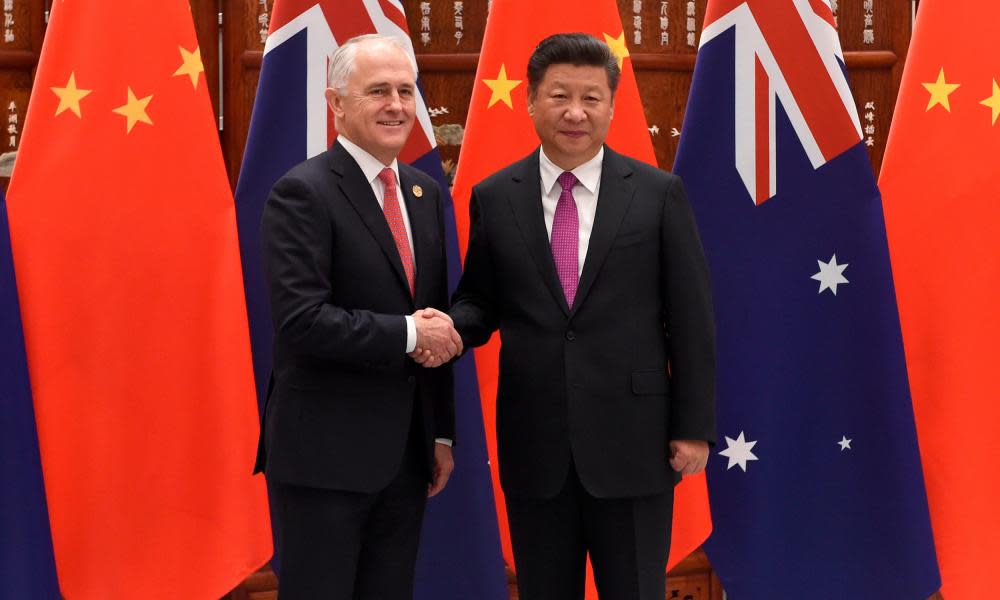China is no threat to Australia, Turnbull says before visit to US

China is not a threat to Australia because it lacks “any hostile intent”, Malcolm Turnbull has said as he embarks on his US visit.
Speaking to Sky News on Thursday, the Australian prime minister sought to play down a more hostile approach to China by the US, rejecting the “out-of-date cold-war prism” of seeing the two superpowers as in competition.
Turnbull said the aim of the trip – which will include regional security talks and a delegation of Australian premiers and business leaders attending the National Governors Association conference – is to “broaden and deepen” the relationship with the US.
Asked if the US viewed China as a “strategic threat”, unlike Australia, Turnbull replied that “a threat is a combination of capability and intent”.
“China has enormous capability, and of course it’s growing [as it becomes] more prosperous … but we do not see any hostile intent from China,” he said. “We do not describe China as a threat.”
Turnbull said Australia and US president, Donald Trump, did not view the Asia-Pacific region “through an out-of-date cold-war prism”, citing Trump’s business experience to demonstrate he “understands the economic significance of China’s rise and its opportunity”.
“Of course there are issues between Washington and Beijing, and there always will be. But the two leaders – and I’ve had privilege of being with both of them – see those issues and address them in a very clear-eyed and candid way.”
Despite the rhetoric of not viewing China as a threat, the Turnbull government has introduced a package of foreign interference bills to ban foreign donations and register foreign lobbyists, which has sparked diplomatic backlash from China.
Kevin Rudd, the former prime minister, has accused the Turnbull government of “neo-McCarthyism” and an “anti-Chinese jihad” in its rhetoric.
Asked about a joint regional infrastructure scheme being developed by Australia, the US, India and Japan as an alternative to China’s belt and road initiative, Turnbull said the media always looks for cold war-style rivalry but “that’s not the way we see the region”.
“We want to maintain the rule of law, the rules-based order, that has enabled this international growth and prosperity,” he said.
Turnbull said the region needed “trillions of dollars of additional infrastructure investment” and to widen the pool of investors by improving legal and governance frameworks.
He said the TPP11 trade agreement would achieve greater economic integration and was “structured so other countries can dock in” and plenty of countries, including the UK, had expressed interest.
“It would be great if the US were able to rejoin – but I don’t think that’s going to happen any time soon.”
“Overwhelmingly” the biggest strategic threat was the “risk of conflict, even nuclear conflict” with North Korea, he said, and the other critical challenge was “the threat of Islamist terror in the region”.
Asked about Trump’s inflammatory rhetoric on North Korea he defended his “very cut-through style” and said he had been able to achieve “very strong sanctions” on Pyongyang with support from Australia and the permanent members of the security council, including Russia and China.
Turnbull said he had “a great relationship” with Trump and the two “get on very well”.
With the text of the TPP11 released on Wednesday, unions have attacked the weakening of labour market testing.
As Guardian Australia reported in December the agreement will allow employers to hire workers from Canada, Mexico, Chile, Japan, Malaysia and Vietnam in 435 occupations without first advertising jobs to Australians.
The trade minister, Steven Ciobo, told Radio National that few workers from TPP countries came to Australia on temporary skilled 457 visas and most related to transfers within a corporation.
Ciobo said that “several years ago” as few as 200 of the 50,000 visa applications came from TPP countries and businesses would “hire an Australian worker first if [they] can find someone”.
He said the labour market provisions “flow both ways” and Australian workers would have better access to other markets.

 Yahoo News
Yahoo News 
